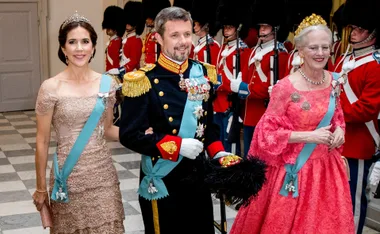Thanks to Australia’s very own Crown Princess Mary of Denmark, we’re all relatively familiar with the Danish Royal Family.
But you might be wondering: how did the Danish monarchy actually start? Allow us to give you a brief history lesson.
The origins of the Danish Royal Family
So, just exactly how old is the Danish monarchy? It turns out that the royal family of Denmark is one of the oldest in the world, with Queen Margrethe II’s heritage able to be traced all the way back to Gorm the Old, who died in 958.
Back then, the monarchy was elective rather than passed down through generations of family. But in 1660, the elective system was replaced with an inherited system, and thus the royal family as we know it was born.
A key milestone for the Danish monarchy was in 1953, when the Act of Succession was introduced. The Act of Succession basically allowed for the possibility of a female monarch to be crowned, and in 1972 Queen Margrethe ascended to the throne.
The Act of Succession was altered in 2009 by Queen Margrethe herself, to allow the first-born child to become monarch, regardless of gender.

Queen Margrethe II with her sons, Crown Prince Frederik and Prince Joachim along with their wives, Crown Princess Mary and Princess Marie.
(Image: Instagram)The Danish monarchy today
Today, the Danish royal family remains quite small, with only a handful of family members given official royal titles.
The people with titles include Queen Margrethe II, her sons Crown Prince Frederik and Prince Joachim, their wives Crown Princess Mary and Princess Marie, and the Crown Prince and Princess’ children: Prince Christian, Princess Isabella, Prince Vincent and Princess Josephine.
Most members of the royal family live relatively “normal” lives. The children go to public schools, and the family is often seen shopping, eating at restaurants, and riding their bikes like regular ol’ Danes.
You might be thinking, how can they live normal lives when they’re super rich? And just how rich is the royal family?
It turns out that apparently the Danish royal family is not as rich as most other European royal families. The Danish monarchy receives the majority of their income from royal provisions granted to them every year by the Danish government as part of the state budget.
This funding amounts to around DKK 82 million (about $17 million AUD), and is set to cover their yearly expenses – most of which is to pay their employees.
Don’t get us wrong, that’s still an insanely huge amount of money, but compared to, say, the British royal family who reportedly has a networth of over 28 billion pounds, the Danish royal family is certainly towards the lower end.

Crown Prince Frederik and Crown Princess Mary with their children, Prince Christian, Princess Isabella, Prince Vincent and Princess Josephine.
(Image: Getty)About the Danish Royal Family
If you’re anything like us, you’re intrigued about more personal details about the Danish royal family.
What is their last name? Where do they live? What religion do they practise? All good questions – and luckily for you, we’ve got the answers.
The Danish royal family don’t have a set last name, but rather the name of the house: Schleswig-Holstein-Sonderburg-Glücksburg. It is often referred to simply as the House of Glücksburg.
The Danish monarchy has nine castles around Denmark, but their main residence is Amalienborg Castle in Copenhagen. Queen Margrethe II, Crown Prince Frederik, Crown Princess Mary and their children spend the majority of their time at Amalienborg Castle.
A requirement for the Danish royal family (especially the monarch) is to be part of the Evangelical Lutheran Church of Denmark (also known as the Danish National Church). As such, Queen Margrethe, Crown Prince Frederik and his children all belong to the Danish National Church. Crown Princess Mary also converted to join the Church of Denmark before she became part of the royal family, as she was originally Presbyterian when she lived in Australia.


